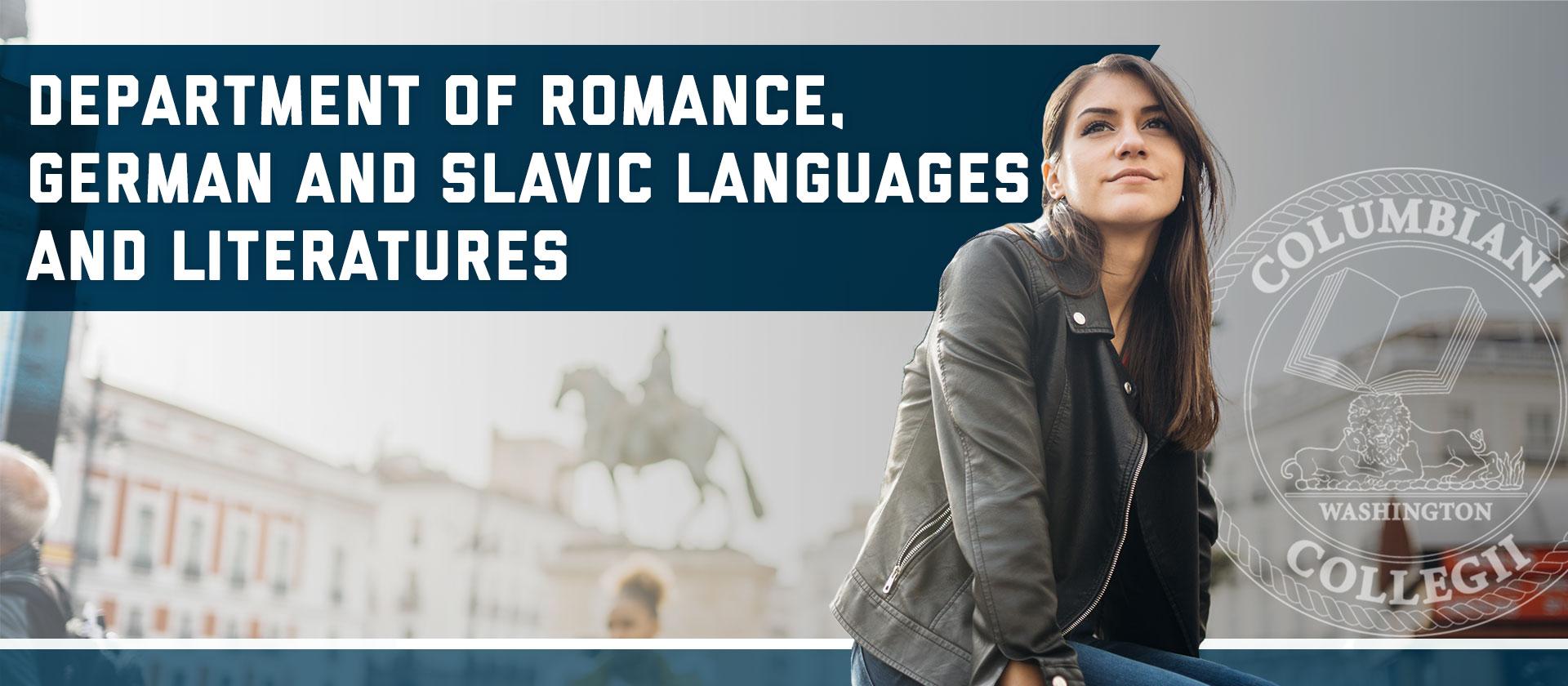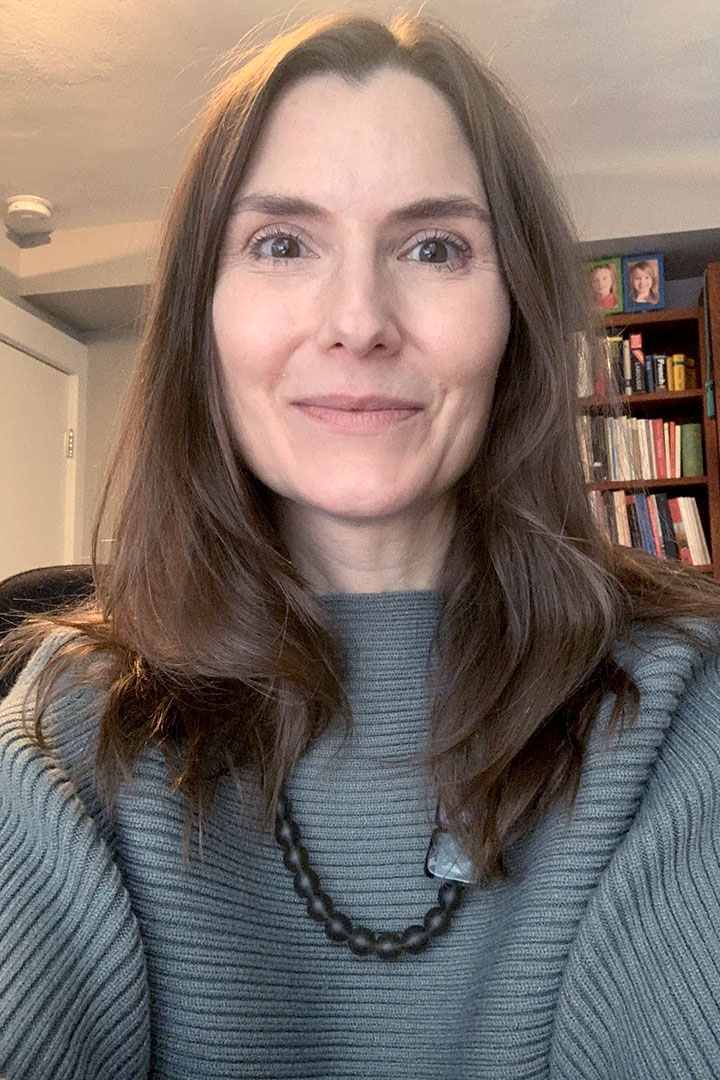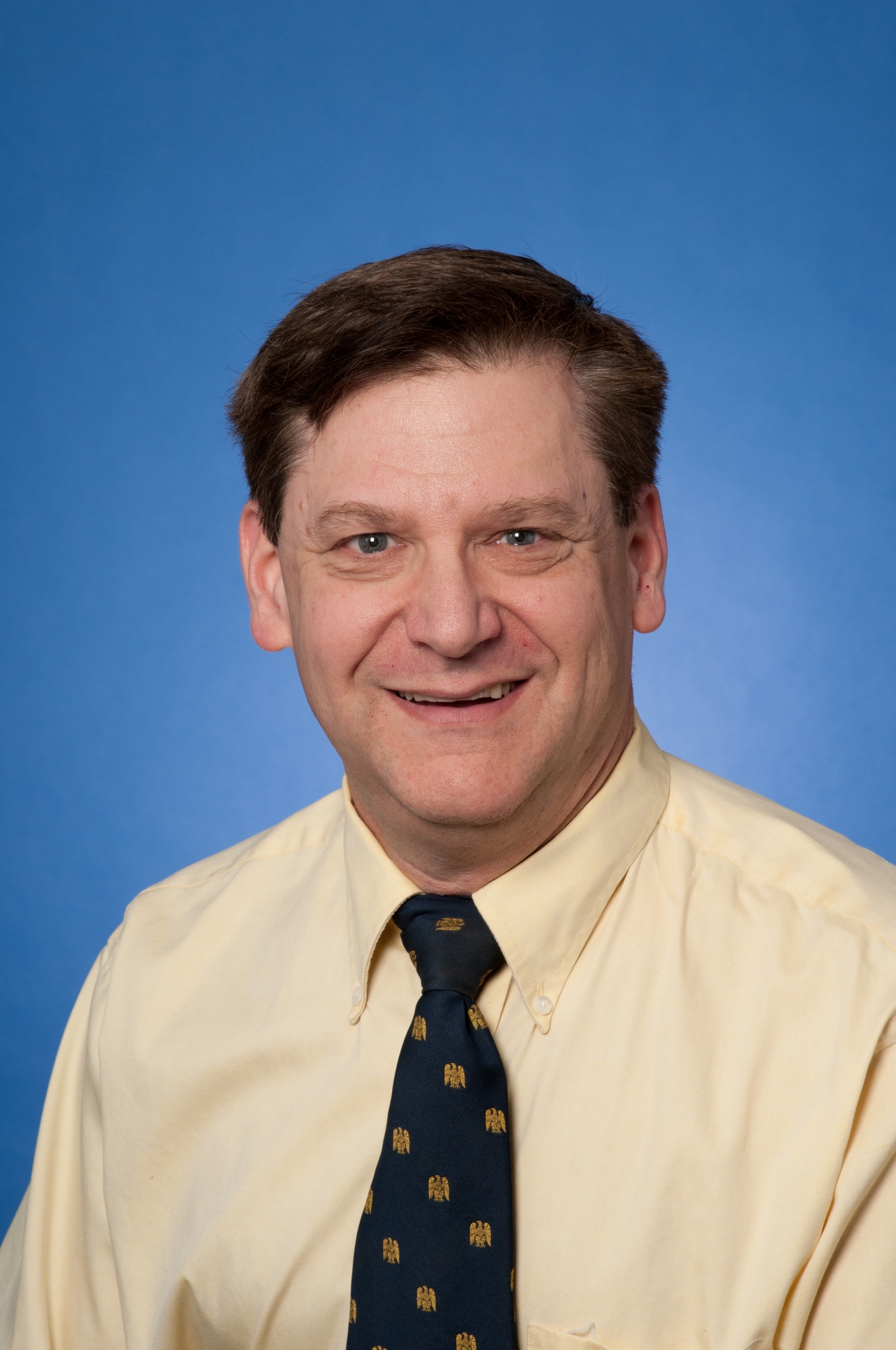2021 RGSLL Department Newsletter

Message from the Chair
Faculty Spotlights
In Memoriam
Department Kudos
Class Notes
Donor Recognition
Message From the Chair
Dear Friends of the GW Department of Romance, German, and Slavic Languages and Literatures,
I am delighted to share with you some of the highlights from this past academic year. Even under these inauspicious circumstances, RGSLL continues to be a lively community of faculty, staff and students passionate about French, German, Italian, Russian, Spanish and Portuguese languages, literatures and cultures. Our faculty has been engaged in innovative scholarship on a variety of topics ranging from Medieval Spanish literature, early modern Italian women writers and post-war German culture to foreign language pedagogy and second-language acquisition. Some of the department scholarship is highlighted below. We offer a broad array of courses, from in-depth study of languages to courses in literature and culture such as Literature and Dictatorship, Early Modern Ecologies and Fairy Tale from Grimm to Disney.
Even though our classrooms have been virtual this past year, our faculty more than met the challenges. They offered dynamic high-quality instruction and created a nurturing and vibrant learning community in a virtual environment. Many of our faculty became real pros at virtual teaching and led workshops on online pedagogy for the GW community. Five of our faculty have been honored to be nominated for teaching awards.
We look forward to the year ahead and a time when we can all be on campus again. Meanwhile, we will continue to bring our best teaching and scholarship to GW. Thank you for your continuing support. We deeply appreciate it. We would love to hear from you! Please share your news with our RGSLL community by writing to [email protected].
With warm wishes,
Masha Belenky
Department Chair
Faculty Spotlights
A New Perspective on Spanish and Latin American Literature
Dr. Manuel Cuellar, assistant professor of Spanish, Latin American, and Latinx literature and cultural studies, joined GW in 2016 after completing his studies at the University of California, Berkeley. He incorporates his unique trajectory from the fields of Mexico to a first-generation college graduate into his interdisciplinary scholarly approach.
His research and classes combine literature, performance, film, dance and queer studies. Dr. Cuellar’s 20-year journey as a cultural studies scholar, a Mexican folklórico dancer both in Mexico and the United States and as a choreographer enables him to engage his research, teaching and diversity work from a unique perspective across disciplines and institutional units. His upcoming book, Choreographing Mexico: Festive Performances and Dancing Histories of a Nation (under contract with University of Texas Press), studies how written, photographic, cinematographic and choreographic renderings of a festive Mexico highlights the role that dance has played in citizen formation and national belonging processes from the late Porfirian regime to the immediate post-revolutionary era (1910–1940).
Bringing Italian Literature to Life
Dr. Lynn Westwater, professor of Italian and director of the Italian Language and Literature program, has taught at GW since 2006. Her research interests include polemical writing in early modern Italy; early modern women's writing; letter writing; convent writing; Venetian culture; the Italian Jewish experience; plagiarism in early modern Italy; women and power in early modern Italy; and cultural production in Italian border regions.
Her books include Sarra Copia Sulam: A Jewish Salonnière and the Press in Counter-Reformation Venice (2020) and numerous co-edited critical editions of early modern women’s writings.
Professor Westwater teaches courses on Italian literature and culture from the 13th century through the 21st century. This semester, she is teaching a new course on Pandemics in Italian Literature and Culture from the Black Plague through COVID-19. As Italian program director, Professor Westwater has secured extensive external support for teaching and student services. This year, she is also co-director of the GW Humanities Center.
Paving the Way for 40 Years
Dr. Richard Robin, professor of Russian and international affairs and director of the Russian Language Program, is a highly regarded scholarly authority on Russia and frequently appears as a political pundit on Russian television. His main areas of expertise are methodology of Russian language teaching and technology in language teaching.
Over the last two years, he has been featured on Russian cable news channels such as RTVi and Redaktsiya. Since the 2020 election, he has been interviewed on Russia's most viewed networks, Channel One and TV-Rain.
Dr. Robin, who has been at GW since 1981, received his PhD in Slavic linguistics from the University of Michigan. He has co-authored a number of textbooks, including Golosa: A Beginning Course in Russian (1993-2013). He also serves as a senior researcher at the National Capitol Language Resource Center.
In Memoriam
JAMES C. KING
It is with deep sadness that we note the recent passing of James C. King, BA '49, MA '50, PhD '54, professor emeritus of German (1991) and former chair of the Germanic Languages and Literature Department.
Professor King joined the GW faculty in 1955, during which time he was an active member of many prestigious societies such as the American Council of Learned Societies, American Goethe Society, Linguistic Society of America, Mediaeval Academy of America, American Association of Teachers of German, From 1964 to 1966, he was president of GW's Chapter of Phi Beta Kappa. He collaborated with Siegfried H. Muller of Adelphi University in establishing and directing the Languages-of-the-World Archives under a contract with the U.S. Office of Education. In 1962, Professor King was appointed deputy member of the Committee on International Exchange of Persons.
After retirement, Professor King donated the official two-millionth volume to the Gelman Library in 2001. The volume, An Illustrated Atlas; Geographical, Statistical, and Historical, of the United States, and the Adjacent Countries by T.G. Bradford, dates from 1838 and shows the individual states, territories and major cities of the United States, with maps of Canada and the West Indies.
The contributions made by Professor Emeritus King will be commemorated in the field for many years to come.
Department Kudos
Masha Belenky worked with Anne O’Neil-Henry to co-edit and co-translate the text Popular Literature from Nineteenth-Century France. She also organized a monthly book dialogue series, NCFS in Captivity.
Maria J. de la Fuente and Carola Goldberg published the textbook Gente, a Task-Based Approach to Learning Spanish. She also wrote the article “Understanding the role of the first language (L1) in instructed second language acquisition (ISLA): Effects of using a principled approach to L1 in the beginner foreign language classroom” in Language Teaching Research.
Margaret Gonglewski spearheaded the move of the Global Business Languages journal from Purdue University to GW and now serves as its co-editor.
Pauline Goul co-authored (with Phillip John Usher) the book Early Modern Écologies: Beyond English Ecocriticism. She is a contributing author with Critical Zones.
Sergio Waisman translated two books by Argentine writers: A Musical Education, a book of poetry by Yaki Setton, and The Regal Lemon Tree, a novel by Juan José Saer.
Lynn Westwater wrote Sarra Copia Sulam: A Jewish Salonnière and the Press in Counter-Reformation Venice. She co-edited and translated (with Meredith K. Ray) the Other Voice in Early Modern Europe Series. (Toronto: Iter Press; Tempe: Arizona Center for Medieval and Renaissance Studies, 2020). She also wrote the article “‘Sottoporsi agli occhi del mondo nelle stampe’: Sarra Copia Sulam and the Venetian Press,” which was featured in the journal Innovation in the Italian Counter-Reformation. Her article, “Saving Naples: The King’s Malaria, the Barons’ Revolt, and the Letters of Ippolita Maria Sforza,” was co-authored with Diana Robin and featured in The Renaissance of Letters: Knowledge and Community.
Yvonne Captain was the keynote speaker in September 2020 at a colloquium in Colombia, South America, which focused on the subject of Manuel Zapata Olivella’s novel Hemingway, el cazador de la muerte. In June, she was a guest lecturer in Dean Darío Henao’s course at the Universidad del Valle, Cali Colombia, on the importance of MZO to Diaspora, Colombian, Latin American and World Letters. She also delivered a keynote address, “ México tenía que ser,” at the Mexican colloquium in November 2020. Se authored the article “Side-Gigs of the Literati: Humanitarianism at its Best” in the Fall 2020 issue of Publication of the Afro-Latin/American Research Association (Palara). She was interviewed for the documentary Zapata, el Gran Putas.
Kathryn A. Kleppinger wrote the article “New Media, New Voices: Booba’s and Sofiane’s Uses of Social Networks to Promote Aspiring Rappers” in Hip-Hop en Français: An Exploration of Hip-Hop Culture in the Francophone World.
Peter Rollberg wrote the article “Khachaturian’s Genius in Film” in An Armenian Film Festival, presented by the Freer Gallery of Art and the Arthur M. Sackler Gallery in collaboration with the National Gallery of Art. He also wrote the film review “Rezo Gigeinishvili. The Sober Driver,” and presented the paper “Abai on Screen” at the conference “For Love Alone Is Just Reward for Love”: The Wisdom of Abai, with Cambridge University Press and the Kazakhstan embassy in London. He was the keynote speaker at the conference The 1150th Anniversary of Al-Farabi: The Legacy of Medieval Wisdom, Central Asian Program.
Heather Bamford won the 2020 MLA La corónica book award for Cultures of the Fragment: Uses of the Iberian Manuscript, 1100-1600 (University of Toronto Press). It was cited as the best monograph published in the field of hispanomedieval studies.
Abdourahman Waberi wrote and produced a radio documentary based on his research project “From Immigrants to African Parisian Artists.” It aired on the France Culture radio channel in October. He also was a presenter at The Lycée Français.
Class Notes
Ruthie Dailing, BA ’00, is a partner at Coogan Smith, LLP, where she handles family law cases and frequently uses her Spanish language skills.. She lives in Massachusetts with her husband and two sons.
Alexandra Drexler, BA ’16, is coordinating the implementation of the Congress-Bundestag Youth Exchange for Young Professionals program as their program officer in Germany.
Mattingly Gerasimovich, BA ’20, recently began his PhD program at Northwestern University in the Department of Slavic Languages and Literatures. His research focuses on the Russian avant-garde and political aesthetics.
Nancy Rogers, MA ’70, PhD ’74, completed her translation of George Sand's Nanon. She is on the board of the George Sand Association.
Colleen Fisher Simons, BA ’07, MA ’10, is the U.S. Department of Commerce's Pacific South regional director. She is responsible for the operations and performance of 10 U.S. Export Assistance Centers with a combined staff of 30 trade specialists in California, Nevada and Hawaii.
Michael Toledo, BA ’88, is an RN for a major medical center in New York City. Previously, he worked for contemporary art galleries and dealers for 15 years.
Paule Voevodsky, BS ’16, took a leave of absence in 2020 to travel and learn French in Quebec. She took courses with Latin Americans and was able to practice her French and Spanish every day.
Donor Recognition
THANK YOU FOR YOUR SUPPORT!
The Department of Romance, German and Slavic Languages and Literatures would like to gratefully acknowledge the following generous donors who made a gift to the department from January 1, 2020–December 31, 2020.
+ Faculty/Staff | # Parent | ~ Student | * Friend
Ernst & Young Foundation
Dr. Warren Ashby, BA ’61, MA ’66
Kerry De Haven, BA ’71
Alicia Falzon, PhD ’88
Daniel Gallagher, BA ’75
Renee Meyer, MA ’77
Sarah Moga, BA ’13
Mark Richter, BBA ’79
Nancy Rogers, MA ’70, PhD ’74
Christine Taraska, BA ’90
Jonathan Vasdekas, BA ’12
Margit Williams, MA ’77
Kristen Zaehringer, BA ’02





